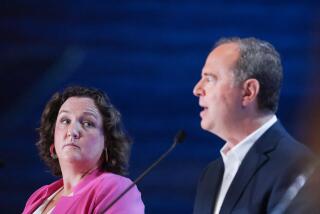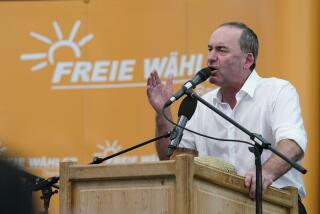German Political Scandal Grows
- Share via
BERLIN — Shadows cast over the 16-year leadership of former Chancellor Helmut Kohl by a corruption scandal darkened Friday with the disclosure by one of his Christian Democratic Union allies that the party has for years maintained secret slush funds.
The concession by former CDU General Secretary Heiner Geissler threatened Kohl’s legacy as the “chancellor of unity.” It also cast doubt on his claim of knowing nothing about donations that were reported by those making them but were never registered in the party’s public accounts.
The ex-chancellor has branded as “slander” the allegations by a Bavarian prosecutor that the former CDU treasurer, Walther Leisler Kiep, accepted a $530,000 payment that was essentially a kickback for Kohl’s approval of an arms sale.
Meanwhile, political fallout from other accusations of bribery and corruption claimed a prominent victim Friday on the opposite side of the political aisle. Lower Saxony Gov. Gerhard Glogowski, a close associate of Chancellor Gerhard Schroeder and a key figure in the ruling Social Democratic Party, resigned after media accounts that he accepted trips, homes and payments for corporate board membership without reporting them or paying taxes.
The two high-profile incidents, although involving party finances in the Kiep affair and personal rewards in the case of Glogowski, served to highlight the entangled relationships between business and government in this country long admired as a paragon of economic prowess.
The Kiep case, which has been front-page news in Germany for weeks, prompted parliament this week to order a probe of political finance practices. Kiep, the 72-year-old head of the prestigious Atlantic Bridge organization that fosters U.S.-German relations, is free on bail pending investigations.
Munich’s influential Sueddeutsche Zeitung reported Friday that prosecutors in the Bavarian city of Augsburg had confiscated records suggesting that CDU officials had parceled out large corporate donations to secret escrow accounts to hide the payments that might be seen as influence peddling. The paper reported detailed entries in the accounts, coded in a way that investigators interpreted to mean that Kohl had personally authorized some of the transfers.
“Yes, in essence, what they say is correct,” Geissler told WDR radio, referring to the newspaper’s report citing anonymous sources. “Aside from the federal party’s budget, there were other accounts.”
Geissler, who served as party general secretary for the first six years of Kohl’s administration, told the radio that he had always questioned the ethics of the slush funds and that “it must all be cleared up now” in the probe of the Kiep case.
Kiep and the party’s finances are under investigation for alleged tax irregularities stemming from a 1991 sale of German-made tanks to Saudi Arabia. A weapons dealer who arranged the sale reported making the payment to Kiep a year later, but party records contain no mention of it.
Kohl, at a news conference Monday, insisted that he had approved the sale to show German solidarity with the United States and its allies in fighting Iraq during the 1991 Persian Gulf War and that he knew nothing of any later donation to his party. Kohl lost the chancellor post when Schroeder’s party defeated the CDU in September 1998 elections, but he remains a member of parliament.
The allegations against the CDU threaten to halt the party’s political comeback. During the past year, the CDU has posted an impressive string of state election victories as voters chafe under budget cutbacks and high unemployment. But the CDU’s chances of winning two important elections in the next six months--in populous North Rhine-Westphalia and in the northern state of Schleswig-Holstein--may be undermined by the widening financial scandal.
However, Glogowski’s resignation amid kickback allegations suggested that the Social Democrats may be in for similar scrutiny.
At a meeting with foreign journalists earlier this week, Schroeder seemed uncharacteristically reluctant to make political capital out of his opponents’ plight, saying the allegations against the rival party hurt not just the CDU but “all of Germany.”
More to Read
Sign up for Essential California
The most important California stories and recommendations in your inbox every morning.
You may occasionally receive promotional content from the Los Angeles Times.













